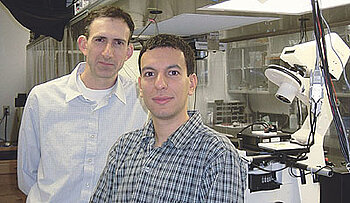The 2008 PI (Physik Instrumente) NanoInnovation Grant™
6The PI NanoInnovation Grant™ supports research related to nanotechnology, optics and biotechnology.
The $25,000 PI NanoInnovation Grant™ program awards funding in the form of equipment to US and Canadian researchers to help them reach their goals in developing new technologies, products or processes related to the nanopositioning requirements of their innovative research.
PI (Physik Instrumente) is the leading supplier of nanopositioning equipment used in the high-technology fields of
- Life Sciences, Biotechnology
- Nanotechnology/MEMS
- Semiconductors
- Photonics, Fiber Optics, Telecom
- Lasers, Optics, Microscopy
- Aerospace Engineering
- Precision Machining
- Astronomy
- Data Storage

2007 Winner
Andrea Lelli, Eric A. Stauffer and Jeffrey R. Holt, University of Virginia Medical School for the submission: “A Fast Mechanical Nanostimulator to Study Sensory Transduction and Amplification in the Inner Ear”
Departments of Neuroscience and Otolaryngology, UVA
2007 Runners Up
Peter RH Stark, Harvard Medical School: "Maskless Optical Lithography Below the Diffraction Limit and Outside of the Near-Field Spectroscopy "
Ovijit Chaudhuri and Sapun H. Parekh, University of California, Berkeley “Scanning Sideview AFM: Simultaneous atomic force microscopy and sideview imaging for studies of cell mechanics”

2006 Winner
Ashley R. Carter, University of Colorado and National Institute of Standards and Technology for the submission "An Ultrastable Scanning Probe Microscope"
2006 Runners Up
Dr. Benjamin Potsaid, Rensselaer Polytechnic Institute: "Active Optical Delay Line Compensator for Terahertz Imaging and Spectroscopy"
Benjamin Lane/ S. Chakrabarti/ T. Cook/ M. Shao/B. M. Levine from MIT/ BU/ JPL: "Direct Imaging of an Extra-Solar Planet using Optical Nulling Interferometry"

2005 Winner
Arthur La Porta and Steven M. Block, Department of Biological Sciences, Stanford University, CA for the submission "Second Generation Optical Torque Wrench"
Stephen Block Lab
Arthur La Port Lab

2004 Winner
John S. Eid, from the Rowland Institute at Harvard University, is the 2004 winner for a proposal entitled "Nano-tracking of single molecules inside a membrane-embedded pore".
John Eid works in Amit Meller's "Biophysics of Single Molecule's" group at the Rowland Institute at Harvard University. Dr. Meller's group is developing an instrument capable of probing FRET signals from individual biopolymers lodged inside a 1.5 nm pore, while simultaneously recording the pore current. The instrument incorporates a PI piezo nano-tracking system and will be employed to speed up the analysis of DNA/RNA structures and kinetics.
Please join us in congratulating all of the winners!
We would also like to thank everyone for their submissions to the PI NanoInnovation™ Grant Program and wish them success in their work!
Who May ApplyGraduate students and post doctoral researchers at academic institutions and research labs, who as principal investigators and sponsored by their faculty supervisor, are pursuing research, experimentation or development in which PI (Physik Instrumente) nanopositioning equipment and technologies are enablers to advance their research.
Awards Amount
For 2007, the total equipment award pool is $25,000 with distributions starting in calendar year 2007. Awards are paid in new PI nanopositioning equipment, in the winning applicant's choice.
2007 Deadline: April 30.
The deadline for the 2007 program is April 30, 2007 with award announcements scheduled for July, 2007. Press releases will be forwarded to research and industry journals with the award winner's name, institution and research project overview shortly after the award announcement is made to the applicant(s).
Applications
Applications should be in electronic format and should describe the project, explaining which PI equipment is planned to be used and for what purpose, up to two pages maximum. More details in terms of diagrams, drawings or pictures of the setup is a definite asset in the application. The applications confidentiality will be treated with the same standards as peer reviewed papers for scientific publication. The winning application(s), consisting of title and abstract along with the applicants name and institution, will be released publicly in company prepared press releases with prior approval by the applicant's institution.
Who Decides Which Proposals Win
The PI NanoInnovation Grant™ Advisory Board. This board consists of three scientific advisors with leadership in their respective technology fields that use and advise the use of nanopositioning equipment and instruments for their research and development activities. The Advisory Board consists of the following distinguished researchers:
Dr. Bharat Bhushan
Director, Nanotribology Laboratory for Information Storage and MEMS
Department of Mechanical Engineering
Professor, Design and Manufacturing
Ohio State University
Dr. Martin Culpepper
Director
Precision Systems Design and Manufacturing Labs
Department of Mechanical Engineering
MIT
Dr. Erik Sanchez
Professor
Ultra High Resolution Scanning Microscopies
Department of Physics
Portland State University
The Award Process
Submitted applications will be collected and sorted by PI USA's Director of Corporate Marketing. After the closing date these submissions will be each sent to the Scientific Advisory Board for scoring and then returned to PI for registering the scores and determining the top scores.